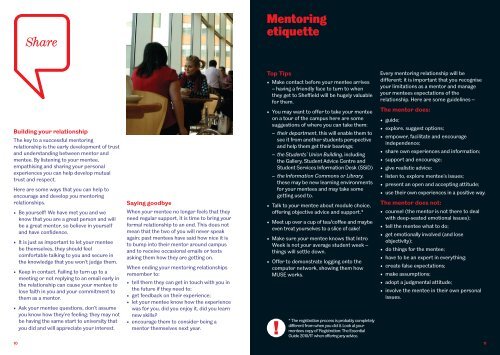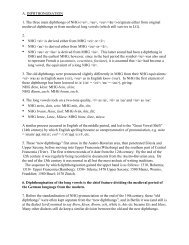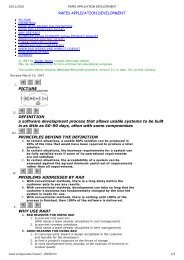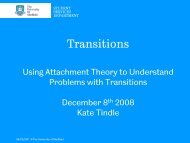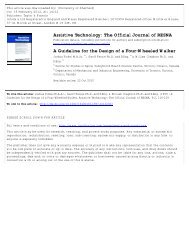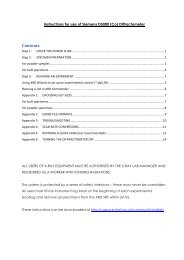Sheffield Mentors Guide 2010/11. - MUSE - University of Sheffield
Sheffield Mentors Guide 2010/11. - MUSE - University of Sheffield
Sheffield Mentors Guide 2010/11. - MUSE - University of Sheffield
Create successful ePaper yourself
Turn your PDF publications into a flip-book with our unique Google optimized e-Paper software.
Building your relationship<br />
The key to a successful mentoring<br />
relationship is the early development <strong>of</strong> trust<br />
and understanding between mentor and<br />
mentee. By listening to your mentee,<br />
empathising and sharing your personal<br />
experiences you can help develop mutual<br />
trust and respect.<br />
Here are some ways that you can help to<br />
encourage and develop you mentoring<br />
relationships.<br />
• Be yourself! We have met you and we<br />
know that you are a great person and will<br />
be a great mentor, so believe in yourself<br />
and have confidence.<br />
• It is just as important to let your mentee<br />
be themselves, they should feel<br />
comfortable talking to you and secure in<br />
the knowledge that you won’t judge them.<br />
• Keep in contact. Failing to turn up to a<br />
meeting or not replying to an email early in<br />
the relationship can cause your mentee to<br />
lose faith in you and your commitment to<br />
them as a mentor.<br />
• Ask your mentee questions, don’t assume<br />
you know how they’re feeling; they may not<br />
be having the same start to university that<br />
you did and will appreciate your interest.<br />
10<br />
Share<br />
Saying goodbye<br />
When your mentee no longer feels that they<br />
need regular support, it is time to bring your<br />
formal relationship to an end. This does not<br />
mean that the two <strong>of</strong> you will never speak<br />
again; past mentees have said how nice it is<br />
to bump into their mentor around campus<br />
and to receive occasional emails or texts<br />
asking them how they are getting on.<br />
When ending your mentoring relationships<br />
remember to:<br />
• tell them they can get in touch with you in<br />
the future if they need to;<br />
• get feedback on their experience;<br />
• let your mentee know how the experience<br />
was for you, did you enjoy it, did you learn<br />
new skills?<br />
• encourage them to consider being a<br />
mentor themselves next year.<br />
Mentoring<br />
etiquette<br />
Top Tips<br />
• Make contact before your mentee arrives<br />
– having a friendly face to turn to when<br />
they get to <strong>Sheffield</strong> will be hugely valuable<br />
for them.<br />
• You may want to <strong>of</strong>fer to take your mentee<br />
on a tour <strong>of</strong> the campus here are some<br />
suggestions <strong>of</strong> where you can take them:<br />
– their department, this will enable them to<br />
see it from another students perspective<br />
and help them get their bearings;<br />
– the Students’ Union Building, including<br />
the Gallery, Student Advice Centre and<br />
Student Services Information Desk (SSiD)<br />
– the Information Commons or Library,<br />
these may be new learning environments<br />
for your mentees and may take some<br />
getting used to.<br />
• Talk to your mentee about module choice,<br />
<strong>of</strong>fering objective advice and support.*<br />
• Meet up over a cup <strong>of</strong> tea/c<strong>of</strong>fee and maybe<br />
even treat yourselves to a slice <strong>of</strong> cake!<br />
• Make sure your mentee knows that Intro<br />
Week is not your average student week –<br />
things will settle down.<br />
• Offer to demonstrate logging onto the<br />
computer network, showing them how<br />
<strong>MUSE</strong> works.<br />
!<br />
* The registration process is probably completely<br />
different from when you did it. Look at your<br />
mentees copy <strong>of</strong> ‘Registration: The Essential<br />
<strong>Guide</strong> <strong>2010</strong>/11’ when <strong>of</strong>fering any advice.<br />
Every mentoring relationship will be<br />
different; it is important that you recognise<br />
your limitations as a mentor and manage<br />
your mentees expectations <strong>of</strong> the<br />
relationship. Here are some guidelines –<br />
The mentor does:<br />
• guide;<br />
• explore, suggest options;<br />
• empower, facilitate and encourage<br />
independence;<br />
• share own experiences and information;<br />
• support and encourage;<br />
• give realistic advice;<br />
• listen to, explore mentee's issues;<br />
• present an open and accepting attitude;<br />
• use their own experiences in a positive way.<br />
The mentor does not:<br />
• counsel (the mentor is not there to deal<br />
with deep-seated emotional issues);<br />
• tell the mentee what to do;<br />
• get emotionally involved (and lose<br />
objectivity);<br />
• do things for the mentee;<br />
• have to be an expert in everything;<br />
• create false expectations;<br />
• make assumptions;<br />
• adopt a judgmental attitude;<br />
• involve the mentee in their own personal<br />
issues.<br />
11


